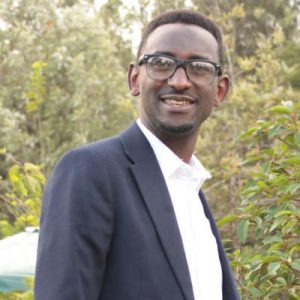In January 2021, #StopEACOP began to be read on social networks and in marches between Africa and Europe, denouncing the French oil company EACOP that would reach the centre of Africa and displace its inhabitants and the biodiversity present there, to install the longest heated crude oil pipeline in the world.
Central Africa is the largest repository of biodiversity, after the Amazon in South America. This campaign was created by a group of Catholics organized by the Laudato Si’ Movement, the so-called Laudato Si’ Animators, collaborating with religious and non-secular organizations in order to stop this deadly project.

Steeven Kezamutima, Coordinator of Francophone Programs in Africa
We spoke to Steeven Kezamutima, a native of Burundi, Coordinator of Francophone Programs in Africa, who was on this organizing team: “The Laudato Si’ Movement reached the French-speaking countries of Africa in 2020, where there are already 20 chapters, that is, 20 communities, with almost 3000 Laudato Si’ Animators so far,” he begins.
Laudato Si’ Animators begin by receiving training through the Laudato Si’ Animators Program and their presence in Africa has been key, as this continent has been stripped of its resources and its inhabitants subjugated for centuries:
“In Africa we have a wealth of resources: plants, animals, seeds, minerals, talents…Why is it then that we are so poor? Why don’t people have their basic rights protected? Why are we living at war? The cry of the earth and the poor is very real here; we are slowly dying. But we read the encyclical Laudato Si‘ and we see that Pope Francis speaks for African countries, for those ‘untouchable’ issues, which even in international meetings were not spoken about,” Steeven says.
Laudato Si’: the voice of so many Africans
According to Kezamutima, for many Africans, Laudato Si’ is the hope they were looking for, the tool they finally obtained to speak out and defend themselves against the social and ecological injustices they live with. The African bishops have already denounced.
This year, from January 31 to February 5, Pope Francis visited the Democratic Republic of Congo and South Sudan, a trip that generated tensions because of the situation in these countries, but above all, because the situation has been handled by countries of the global North and Pope Francis was willing – as he had previously done in Laudato Si’ – to talk about it:
“In his speech, the Pope said ‘stop stealing from the Congo!’ He dared; no one had ever said it like that. He was the voice of the poor and the Earth. And we hope that this courage that Pope Francis has, our members also have to take back the power of their lives, of the situation. We want to give them that message of empowerment,” says Steeven.
Learn more about ‘ecological sins’ and ecological conversion in our 2023 Laudato Si’ Lent calendar
Empowerment and fellowship: Laudato Si’ Animators Program
This program offers free, virtual and face-to-face training on topics such as: Laudato Si’, the environmental crisis, ecological spirituality, the Church’s Social Doctrine, and community leadership training, among other things.
We are not a movement to start revolutions and fight,” Steeven remarks, “but we seek to lead others through our faith, and to return to that garden of Eden, without the need to compete and exploit each other. To share with love, to have compassion and solidarity in our community, to live the vocation of being protectors of Creation. The Creator created all this for us and we must respect it and pass something on to our future generations.”
This has become urgent because, as Steeven relates, Africans – due to atrocities, social and environmental injustices, political corruption, disease and war – have become silenced, and Laudato Si’ Movement has become a space for people to meet and heal their communities and their planet: “In their groups, animators can talk about their problems, find solutions, pray for creation and discuss what legacy we are leaving for the generations to come,” he says.
From a local movement to a global campaign: #StopEACOP!
Something that distinguishes the Laudato Si’ Animators is that they are strengthened in community and through small, necessary gestures, according to Steeven: “We motivate them by telling them that they can start with a simple purpose or change, with their friends, that doesn’t require many resources; it can be an action or even a prayer. We encourage them to make it a way of life. They then inspire others, and so many more follow”.
In this way the global campaign #StopEACOP was achieved in which Laudato Si’ Animators collaborated with about 30 secular and religious organizations, gathered to receive training and agree on strategies: ” Screening the film The Letter helped us a lot because it shows the reality of Africa and how everything is interconnected: poverty, climate, deforestation, violence,” describes Steven and adds,
“This campaign was digital. Once a week we animators would do a “‘tweetstorm” through our account, denouncing the EACOP project in East Africa that would affect human rights, biodiversity and democracy. We managed to mobilize animators in Europe and reached the Vatican! We also collaborated with the #DeCoalOnize campaign.”
“We like to show that God is not up there, he is here walking with us, and Pope Francis, Laudato Si’ Movement and its local communities are proof of that. We are a sustainable movement, especially because we continue to grow. We care about the cause of caring for people’s lives, our resources, our reconciliation with God, with others and with Creation to create a more just world,” Steeven concludes.
Want to join a local community of Laudato Si’ Animators? Register at: laudatosianimators.org

Recent Comments